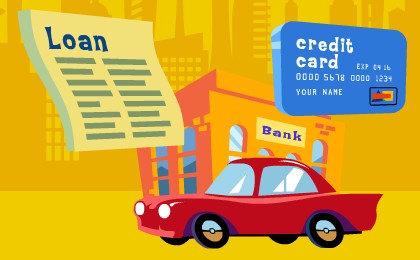Most people use their credit cards to pay for expensive purchases, such as the latest smart phone or LED television. However, retailers offer other funding options through tie-ups with financial institutions, such as banks and non-banking financial companies (NBFCs).
These include credit card loans and consumer durable finance. Both of these entail certain advantages and disadvantages. Therefore, before deciding on which is a better option, understanding these loans is beneficial.
Credit card
Under this option, you use the credit card to pay for your purchase. The amount is then converted to a loan, which is repayable in Equated Monthly Installments (EMIs). The EMI comprises of the principal and interest. Compared to the interest rate charged on regular credit card expenses, such loans entail a lower interest rate. However, the available limit on your credit card will be reduced by the loan amount.

(Source: www.handsonbanking.org)
Consumer durable loans
A consumer durable loan is offered by banks as well as NBFCs. You need to make a small down payment while opting for this loan. Most institutions fund up to 95% of the product’s cost price. Furthermore, you will have to pay a nominal processing fee to apply for a consumer durable loan. The borrowed amount is repaid through EMIs over a pre-determined loan tenure.
Credit card vs. Consumer durable loan
1. Down payment
When you choose a Consumer durable loan, you will have to pay some amount as down payment. On the other hand, the entire purchase price after deducting the discount, if any is converted to a loan when using your credit card.
2. Interest and other charges
The cost of borrowing is the most important factor while considering credit card vs. loans. The interest rate on credit cards is higher than that on Consumer durable loans (CDL). However, you need to pay processing fees when you choose CDL to fund your expensive purchase.
There are certain Banks & NBFC’s that offer 0% Interest Rate on Credit Card Purchase in respect of select items or for select company products.
3. Late payment charges
If you delay the repayment of your credit card, you will have to pay exorbitant late payment charges. Furthermore, an additional interest may be charged for the delay. Such penalties are generally not levied in case of Consumer durable loans where you pay the EMI without a credit card.
You must consider your financial situation, scheme offered by the retailers and the reputation of the lender while making a decision between the two options. It is also advisable to conduct extensive research on various schemes available to find the most affordable loan option suited for you.





Very Informative Blog, I got a lot of information about Credit Card vs. Consumer Durable Loan.